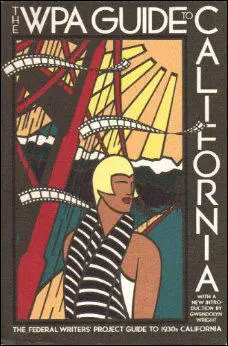The Federal Writers' Project
The Works Projects Administration (WPA) was established by Franklin D. Roosevelt in 1935 as part of the New Deal attempt to combat the Depression. This included the The Federal Writers Project to provide employment for historians, teachers, writers, librarians, and other white-collar workers. The project was directed by Henry Alsberg, a former journalist and theatre director. Originally, the purpose of the project was to produce a series of sectional guide books under the name American Guides, focusing on the scenic, historical, cultural, and economic resources of the United States. Over the next couple of years the project was responsible for about a thousand publications, including fifty-one state and territorial guides, thirty city guides, and twenty regional guides. (1)
Writers involved in the project included Richard Wright, Claude McKay, John Steinbeck, Ralph Ellison, Studs Terkel, Zora Neale Hurston, Nelson Algren, Conrad Aiken, William Attaway, Saul Bellow, Max Bodenheim, John Cheever, Vardis Fisher, Fountain Hughes, Weldon Kees, Kenneth Patchen, May Swenson, Jim Thompson, Frank Yerby, Margaret Walker, Dorothy West and Anzia Yezierska.
William E. Leuchtenburg, the author of The FDR Years: On Roosevelt and His Legacy (1995): "Project workers transcribed chain gang blues songs, recovered folklore that would otherwise have been lost... In Chicago WPA workers translated half a century of foreign language newspapers, a project requiring seventy-seven reels of microfilm... When the magazine Story conducted a contest for the best contribution by a Project employee, the prize was won by an unpublished twenty-nine-year-old who had been working on the essay on the Negro for the Illinois project. With the prize money for his tales, subsequently published as Uncle Tom's Children, Richard Wright gained the time to write his remarkable first novel, Native Son." (2)
The outpouring of literature under the sponsorship of the Federal Writers' Project was "one of the most remarkable phenomena of the era of crisis" wrote the critic Alfred Kazin in his book, On Native Grounds: An Interpretation of Modern American Prose Literature (1942): "Whatever form this literature took... it testified to an extraordinary national self-scrutinizing... Never before did a nation seem so hungry for news of itself." (3)

One of the most impressive projects was the Slave Narrative Collection, a set of interviews which led to slave narratives based on the experiences of former slaves, with the work culminating in over 2,300 first-person accounts of slavery and 500 black-and-white photographs of former slaves. This was organised as a state-level branches of the Federal Writers' Projects in seventeen states, working largely separately from each other. (4)
On 26th May, 1938, the United States House of Representatives authorized the formation of the Special House Committee on Un-American Activities. The first chairman of the Un-American Activities Committee (HUAC) was Martin Dies. The original intention of the HUCA was to investigate both left-wing and right wing political groups. However it was soon clear that his main target was New Deal initiatives such as the Federal Writers' Project. John Parnell Thomas, a member of the HUCA, commented that on the basis of "startling evidence" that the project was "a hotbed for Communists". (5)
Dies pointed out in his book, The Trojan Horse in America (1940): "Stalin could not have done better by his American friends and agents. Relief projects swarmed with Communists - Communists who were not only recipients of needed relief but who were entrusted by New Deal officials with high administrative positions in the projects. In one Federal Writers' Project in New York, one third of the writers were members of the Communist Party. This was proven by their own signatures. Many witnesses have testified that it was necessary for W.P.A. workers to join the Workers Alliance - high-pressure lobby run by the Communist Party - in order to get or retain their jobs.... Several hundred Communists held advisory or administrative positions in the W.P.A. projects." (6)
Primary Sources
(1) William E. Leuchtenburg, The FDR Years: On Roosevelt and His Legacy (1995)
Works Projects Administration (WPA) was the greatest financial boon which ever came to the Communists in the United States. Stalin could not have done better by his American friends and agents. Relief projects swarmed with Communists - Communists who were not only recipients of needed relief but who were entrusted by New Deal officials with high administrative positions in the projects. In one Federal Writers' Project in New York, one third of the writers were members of the Communist Party. This was proven by their own signatures. Many witnesses have testified that it was necessary for W.P.A. workers to join the Workers Alliance - high-pressure lobby run by the Communist Party - in order to get or retain their jobs.... Several hundred Communists held advisory or administrative positions in the W.P.A. projects.
(2) Martin Dies, The Trojan Horse in America (1940)
Works Projects Administration (WPA) was the greatest financial boon which ever came to the Communists in the United States. Stalin could not have done better by his American friends and agents. Relief projects swarmed with Communists - Communists who were not only recipients of needed relief but who were entrusted by New Deal officials with high administrative positions in the projects. In one Federal Writers' Project in New York, one third of the writers were members of the Communist Party. This was proven by their own signatures. Many witnesses have testified that it was necessary for W.P.A. workers to join the Workers Alliance - high-pressure lobby run by the Communist Party - in order to get or retain their jobs.... Several hundred Communists held advisory or administrative positions in the W.P.A. projects.
Student Activities
Economic Prosperity in the United States: 1919-1929 (Answer Commentary)
Women in the United States in the 1920s (Answer Commentary)
Volstead Act and Prohibition (Answer Commentary)
The Ku Klux Klan (Answer Commentary)
Classroom Activities by Subject
